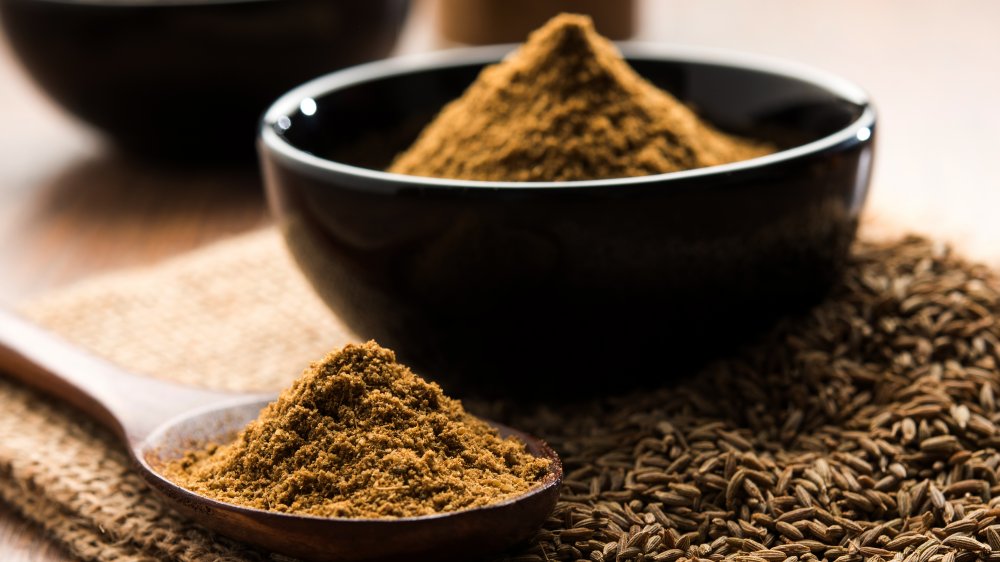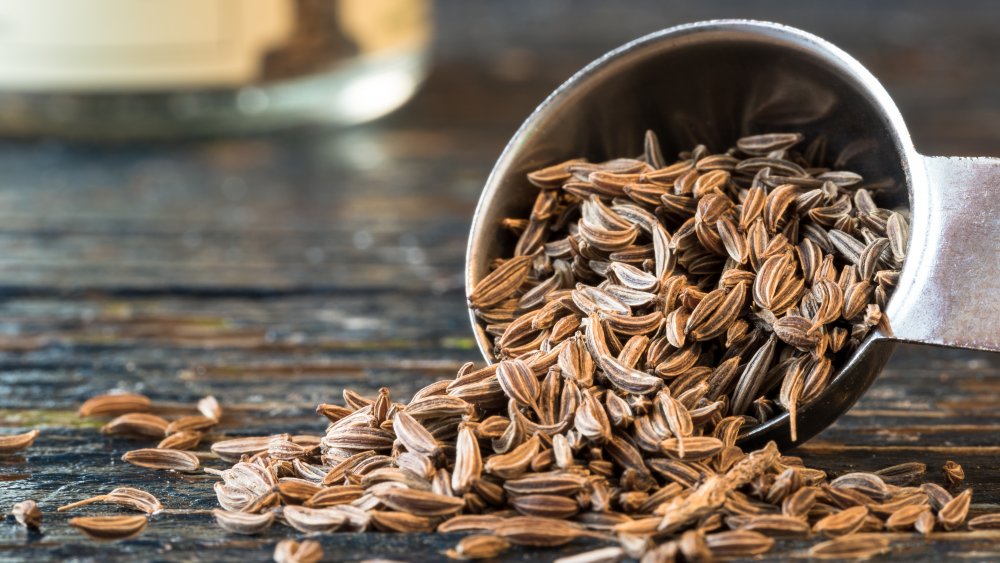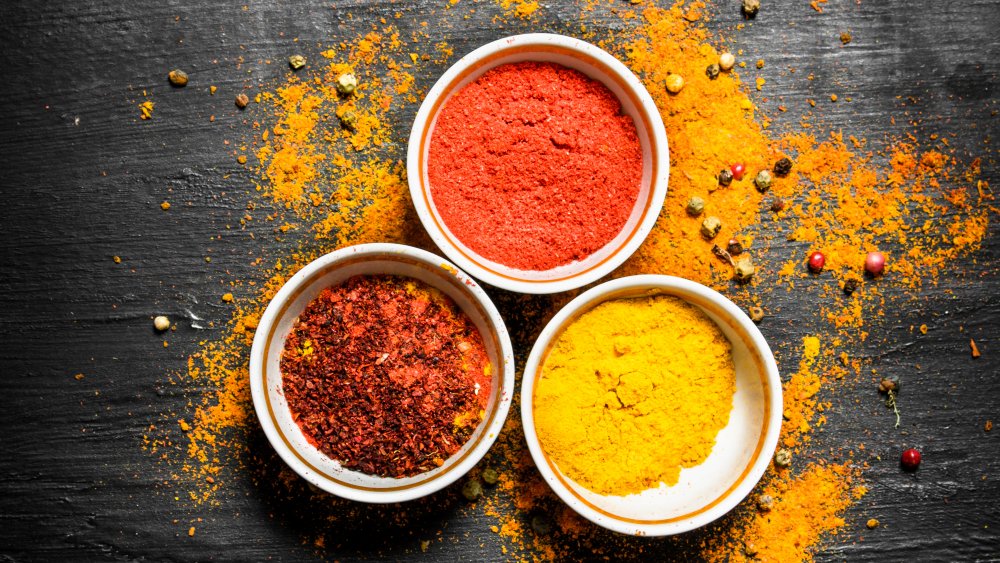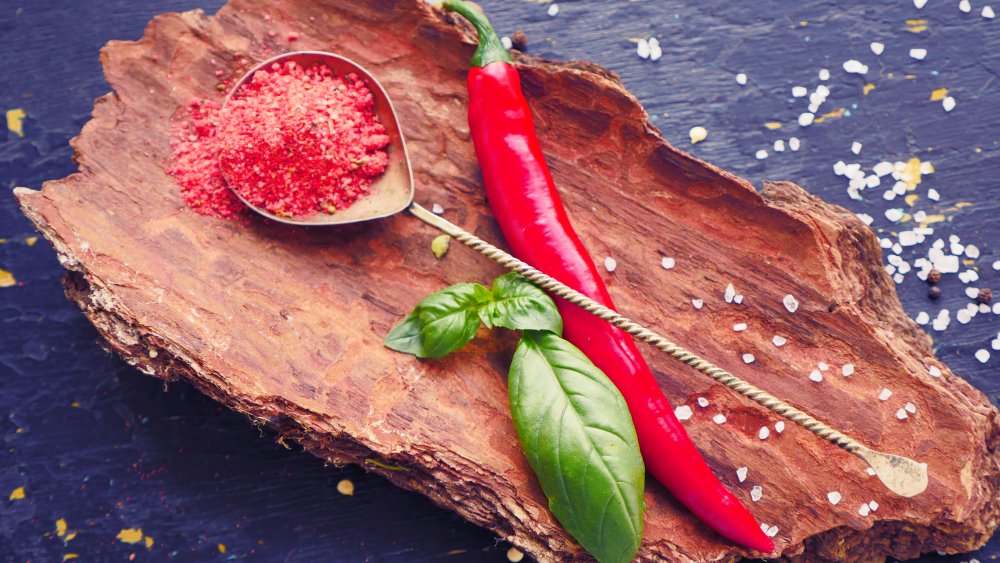Here's What You Can Substitute For Cumin
If you've ever gotten ambitious enough to try your hand at preparing a Middle Eastern dish like homemade hummus or gotten the urge to challenge your skills in the kitchen with a multi-step Indian curry, you've probably stumbled across cumin as a listed ingredient. But what if you're halfway through your prep process before you realize you don't have it?
There's no need to eat dry pita or swap vindaloo for fast food. When you do discover that you have no cumin on hand, there are actually plenty of ready substitutes that you likely already have in your pantry.
To understand why these substitutions work, it's important to know what cumin tastes like. According to Spices Inc, cumin is related to anise, caraway, coriander, dill, and fennel. It has a warm, nutty, earthy taste that can verge on bitter for some people, and it can definitely overpower a dish if you're not careful. The part of the cumin plant used for seasoning food is actually just the seed, and you can find it in that form. If a recipe calls for cumin powder, it's asking you to add the ground up, powdered version of that seed. While cumin does have a pretty distinctive taste, you can get close to its flavor with a few spice cabinet staples.
Best substitute for cumin seeds: Caraway seeds
Caraway seeds closely resembles cumin seeds and both come from the parsley family, according to The Spruce Eats. In fact, The Spruce Eats also says people sometimes get the two confused because they look so similar. If you look closer, though, you'll see that caraway is a little smaller and darker in color, and while cumin can be used as whole seeds or ground, caraway is typically only used as seeds.
Though caraway seeds won't have the same warm flavor profile as cumin, they are similar enough to work as a substitute. Due to what some consider an anise flavor of caraway, however, it's recommended that you start with half as many caraway seeds as the recipe calls for and adjust from there to taste.
Best substitute for cumin powder: Curry powder
Using curry powder as a cumin substitute is admittedly a bit of a cheat, but it's an effective one. The not-so-great news is that for real authentic curries, curry powder won't help recreate the nuanced, varied flavors of the many dishes from the many countries where what we know as "curries" come from (via Raw Spice Bar). The very good news is that if you're looking for a way to sub out cumin, you can do so with a jar of pre-mixed curry powder.
Curry powder just refers to a commercially available blend comprised of the spices that typically find their way into dishes like tikka masala and spiced lentils. That spice blend, like McCormick's, is almost sure to include turmeric, coriander, and — you guessed it — cumin, which is often found fairly high on the ingredient list. So if you have a little jar of the stuff on your spice rack, substituting curry powder for cumin will work just fine, and can preserve (or even enhance) the original flavor you were going for as it lends a similar earthy spicy notes to your dish. One thing to know, though, is that curry powder will change the color of your dish, thanks to the bright yellow turmeric that's likely included.
As with caraway seeds, The Spruce Eats recommends starting with half the amount of cumin that's called for when substituting curry powder.
Best substitute for cumin powder in Mexican food: Chili powder
While curry powder can be a perfectly good cumin substitute for certain types of dishes, it often contains ingredients like ginger and fenugreek, which really aren't the first ingredients that come to mind when you're working with a Tex-Mex or Mexican-inspired recipe. The good news is that there's another spice blend you can reach for when you run out of cumin.
In cases like these, you're going to want to find something that comes close to the warm, earthy flavor cumin provides without adding incongruous flavors like cardamom and ginger, and according to The Spruce Eats, that's where chili powder comes in. Like curry powder, chili powder is a blend that, among other spices, also contains cumin, and its mild, smoky flavor is a really good bet when you're out of the real deal.
When using chili powder in place of cumin, start with half of what's called for and adjust to taste as it will add more heat to your dish, while also altering the color.



